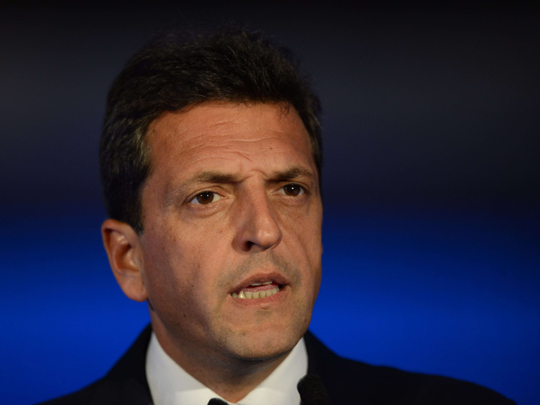
The results of Argentina’s presidential election were still rolling in on Sunday night when opposition candidate Mauricio Macri raised his hands through a cloud of confetti.
“What happened today shows that the politics of this country has already changed,” said the Buenos Aires mayor, whose strong second-place finish surprised pollsters and pundits, and was a sharp rebuke to President Cristina Fernandez de Kirchner. “Kirchnerismo,” he said, referring to the outgoing leader’s erratic brand of rule, “is history”.
Not quite yet. Macri must still win a November 22 runoff against Fernandez’s chosen successor, Governor of Buenos Aires province Daniel Scioli. Still, the fact that Macri earned enough of the vote to force a runoff — and that Fernandez’s Victory Front alliance lost both its congressional majority and the key race for Buenos Aires governor — suggests that after 12 years under one of the hemisphere’s most caustic political dynasties, Argentines are anxious for something new.
Whether they’ll get it is another question. What’s important is not the name of Argentina’s next president, but whether Fernandez’s exit will mean the end of Kirchnerismo — a vertiginous blend of ultra-nationalism, economic dirigisme and populist promises flung from the balcony, with which not even Scioli wishes to be fully associated.
On the Kirchner family’s watch, Argentina went from a recovering emerging market to an international pariah. After taking office in 2003, Nestor Kirchner set the tone, blasting big business and stiffing creditors. When Fernandez took over in 2007, instead of conciliating, she doubled down on her husband’s quarrels, adding big agriculture to the foes.
Shaken, but unbowed, by Nestor’s death in 2010, Fernandez clashed with farmers again, nationalised foreign companies, bullied critical journalists and invoked a contentious law to push for the break-up of media group Grupo Clarin. When the country’s fortunes plunged, she turned on enemies, at home and abroad. Honours to “debt vultures”, holdout creditors who refused to swallow severe write-downs on their loans, have tied Argentina up in international courts for the last decade.
Aggressive social spending may have helped offset Kirchnerismo’s abrasiveness. With a lift from the global commodities bonanza, Argentina’s economy grew at an average of almost 8 per cent a year between 2003 and 2012. Fernandez poured that windfall into lavish consumer subsidies and wage increases, in a spending drive that continued even as the economy began to tank in 2014.
Whichever candidate takes office on December 10 will have to deal with an economy tumbling into recession, 25 per cent inflation, a spiking public deficit and hard currency reserves down to a nine-year low. Almost 29 per cent of Argentines lived in poverty last year, up from 25 per cent in 2011, according to a study by the Catholic University of Argentina. It’s therefore no surprise that all the top contenders in Sunday’s election took care to distance themselves to varying degrees from Kirchnerismo’s profligacy. That includes Scioli, who signalled that he would rein in spending and sit down with the litigious bond holders.
The country could use some parsimony. Unsustainable spending and bottomless subsidies became the norm under the Kirchners: An estimated 12 million consumers pay just 35 pesos (Dh13.53) a month for electricity — the price of a double espresso with milk — said Scioli’s top economic adviser, Miguel Bein.
People also didn’t truly know how badly the economy was faring, given that fudging statistics was a regular practice. Macri spent much of his campaign focusing on how to rescue the national statistics bureau, Indec, where inaccurate inflation and growth data earned the Fernandez government a rebuke by the International Monetary Fund.
Still, getting Argentines to accept that the days of generous social spending may need to be numbered won’t be easy. A recent poll found that although half of Argentines disapproved of Fernandez’s government, 35 per cent favoured “change with continuity” and another 27 per cent wanted more of the same.
Such is the challenge facing Argentina’s next leader, caught between economic emergency and populist temptation. Macri may be the best bet the country has had in years to change the Kirchnerist script. But first he must convince voters that he will end the costly stalemate with creditors, and that promising Argentines benefits the country can’t afford is no way to return to solvency and growth — it’s just talk from a balcony.
— Washington Post
Mac Margolis is a Bloomberg View contributor based in Rio de Janeiro.












